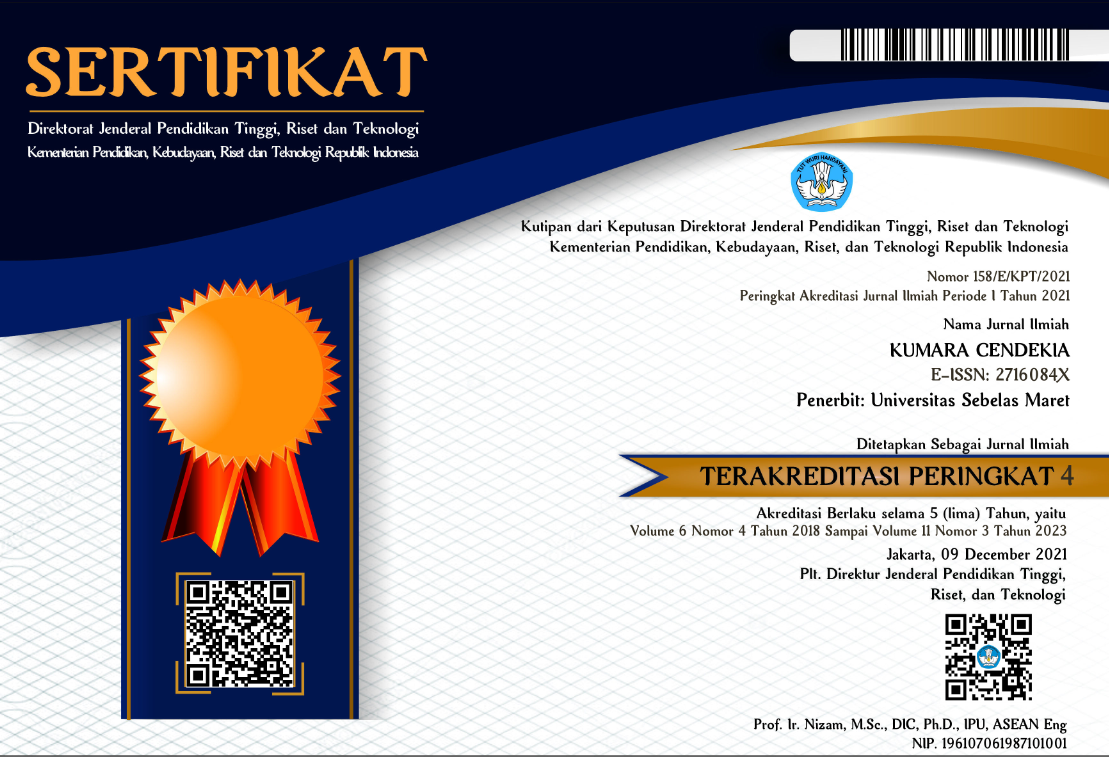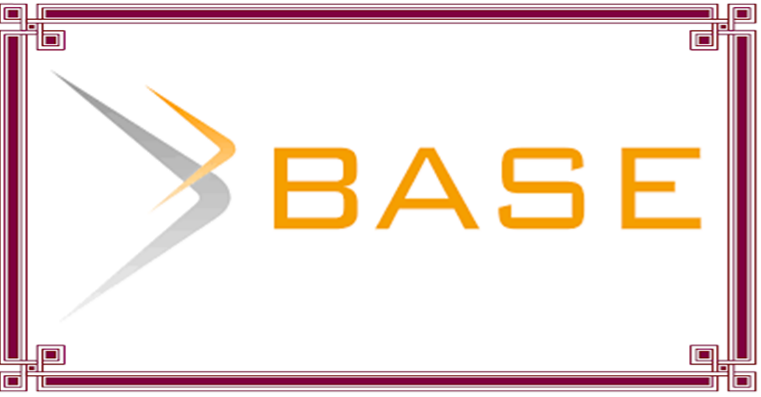EFEK METODE SERVICE LEARNING TERHADAP KEMANDIRIAN ANAK
Abstract
Penelitian ini bertujuan untuk mengetahui seberapa besar pengaruh penggunaan metode service learning terhadap kemandirian anak. Penelitian ini merupakan penelitian kuantitatif jenis eksperimen menggunakan metode eksperimen murni (True Experimental Design). Design penelitian yang digunakan adalah Between Subject Design. Populasi dari penelitian ini adalah seluruh anak kelompok B TK Aisyiyah Nusukan I Surakarta. Random assigment digunakan dalam pengambilan sampel. Teknik pengumpulan data melalui skala kemandirian, wawancara, dokumentasi, dan observasi. Berdasarkan hasil analisis menunjukkan bahwa terdapat pengaruh positif penggunaan metode service learning terhadap kemandirian anak. Anak laki-laki dan perempuan mempunyai perbedaan dalam kemandirian. Anak perempuan memiliki kemandirian lebih tinggi daripada anak laki-laki, karena anak perempuan lebih patuh, bisa mengontrol diri sendiri, dan mampu membuat pilihan yang lebih baik.
Kata kunci: kemandirian anak, metode service learning, perkembangan anak, jenis kelamin
Full Text:
PDF (Bahasa Indonesia)References
Baggerly, J. (2006). Service Learning With Children Affected by Poverty: Facilitating Multicultural Competence in Counseling Education Students. Journal of Multicultural Counseling and Development. 34 (4) 244-255.
Cramer, J. R. (2008). Reviving the Connecion Between Children and Nature Through Service-Learning Restoration Partnerships. Native Plants Journal. 9 (3) 278-286.
Darby, A., Avital, B. L., Jenna, C., & Haglund, M. (2013). Students’ Motivation in Academic Service-Learning Over the Course of the Semester. College Student Journal is the Property of Project Innovation, Inc. 185-191.
Dirjen PAUDNI. (2009). Peraturan Menteri Pendidikan Nasional tentang Standar Pendidikan Anak Usia Dini. Kementrian Pendidikan Nasional : Jakarta.
Green, C. (2013). A Sense of Autonomy in Young Children’s Special Places. International Journal for Early Childhood Environmental Education. 1 (1) 8-31.
Hurlock, E. B. (2005). Child Development. Terjemahan. Edisi keenam. Jilid 1. Erlangga : Jakarta.
Lake, L. W., Crouter, A. C., & McHale, S. M. (2010). Developmental Patterns in Decision-Making Autonomy Across Middle Childhood and Adolescence: European American Parents’ Perpectives. Child Development. 81 (2) 636-651.
Lake, V. E. & Jones, I. (2008). Service-Learning in Early Childhood Teacher Education: Using Service to Put Meaning Back Into Learning. Teaching and Teacher Education. (24) 2146-2156.
Pakulski, L. A. (2011). Addressing Qualified Personnel Shortages for Children Who Are Deaf or Hard of Hearing With an Interdisciplinary Service Learning Program. American Journal of Audiology. (20) S203-S219.
Papalia, D. E., Old, S. W., & Feldman R. D. (2010). Human development. Terjemahan. Kencana : Jakarta.
Pinyoanuntapong, S. (2013). The Development of Thai Childhood Education Curriculum to Promote Desirable Characteristics of Preschool Children. Social and Behavioral Sciences. (88) 321-327.
Roemmich, J. N., Lambiase, M. J., McCarthy, T. T., Feda, D. M., & Kozlowski, K. F. (2012). Autonomy Supportive Environents and Mastery as Basic Factors to Motivate Physical Activity in Children: A Controlled Laboratory Study. International Journal of Behavior Nutrition and Physical Activity. 9:16.
Romich, J. L. & Lundberg, S. (2009). Independence Giving or Autonomy Taking? Childhood Predictors of Decision-Sharing Patterns Between Young Adolescents and Parents. Journal of Research on Adolescence. 19 (4) 587-600.
Russell, S. & Bakken R. J. (2002). Development of Autonomy in Adolescence. Family Life Adolenscence and Youth. Neb Guide.
Ruyter, D. J. D. & Schinkel, A. (2013). On the Relations Between Parents’ Ideals and Children’s Autonomy. Educational Theory. 63 (4) 369-388.
Szente, J. (2009). Academic Enrichment Programs for Culturally and Linguistically Diverse Children A Service-Learning Experience. Childhood Education. 85 (2) 113-117.
Refbacks
- There are currently no refbacks.












